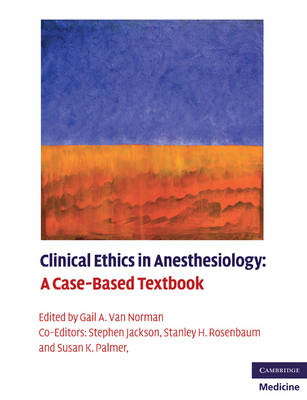
Clinical Ethics in Anesthesiology
Cambridge University Press (Verlag)
978-0-521-13064-6 (ISBN)
Ethical issues facing anesthesiologists are more far-reaching than those involving virtually any other medical specialty. In this clinical ethics textbook, authors from across the USA, Canada and Europe draw on ethical principles and practical knowledge to provide a realistic understanding of ethical anesthetic practice. The result is a compilation of expert opinion and international perspectives from clinical leaders in anesthesiology. Building on real-life, case-based problems, each chapter is clinically focused and addresses both practical and theoretical issues. Topics include general operating room care, pediatric and obstetrical patient care, the intensive care unit, pain practice, research and publication, as well as discussions of lethal injection, disclosure of errors, expert witness testimony, triage in disaster and conflicts of interest with industry. An important reference tool for any anesthesiologist, whether clinical or research-oriented, this book is especially valuable for physicians involved in teaching residents and students about the ethical aspects of anesthesia practice.
Gail A. Van Norman is Professor of Anesthesiology and Pain Medicine and Adjunct Professor of Biomedical Ethics, University of Washington, Seattle, Washington, USA. Susan K. Palmer is Staff Anesthesiologist and Patient Safety Committee Chair, Oregon Anesthesiology Group (OAG), and Patient Safety Organization (PSO) Co-Chair, Anesthesia Business Group (ABG), Eugene, OR, USA. Steve Jackson is Chief of Staff (retired), Department of Anesthesiology, and Chair of the Bioethics Committee, Good Samaritan Hospital San Jose, CA, USA. Stanley H. Rosenbaum is Professor of Anesthesiology, Internal Medicine and Surgery, Director, Section of Perioperative and Adult Anesthesia, and Vice Chairman for Academic Affairs, Department of Anesthesiology, Yale University School of Medicine, New Haven, CT, USA.
Preface; Part I. Consent and Refusal: 1. Informed consent: respecting patient autonomy; 2. Informed refusal: DNR orders in the patient undergoing anesthesia and surgery, and at the end of life; 3. Informed refusal - the Jehovah's Witness patient; 4. Surrogate decision-making; 5. Informed consent and the pediatric patient; 6. Do not resuscitate decisions in pediatric patients; 7. Consent in laboring patients; 8. Maternal-fetal conflicts: Cesarian delivery on maternal request; 9. Consent for anesthesia for procedures with special societal implications: psychosurgery and electroconvulsive therapy; 10. Ethical use of restraints; 11. The use of ethics consultation regarding consent and refusal; 12. Consent and cultural conflicts: ethical issues in pediatric anesthesiologists' participation in female genital cutting; 13. Communitarian values in medical decision-making: Native Americans; 14. Informed consent for perioperative testing: pregnancy testing and other tests involving sensitive patient issues; Part II. End-of-Life Issues: 15. The principle of double effect in palliative care: euthanasia by another name?; 16. Surgical interventions near the end of life: 'therapeutic trials'; 17. Withholding and withdrawing life support in the intensive care unit; 18. Discontinuing pacemakers, ventricular assist devices and implanted cardioverter-defibrillators in end-of-life care; 19. Brain death; 20. Ethical issues in organ donation after cardiac death; 21. Revising the uniform anatomical gift act: the role of physicians in shaping legislation; 22. Physician aid in dying and euthanasia; Part III. Pain Management: 23. Ethical considerations in interventional pain management; 24. Conjoining interventional pain management and palliative care: considerations for practice, ethics and policy; 25. Opioid therapy in addicted patients: background and perspective from the United Kingdom; 26. Opioid therapy in addicted patients: background and perspective from the United States; Part IV. Research and Publication: 27. Ethics in anesthesiology research using human subjects; 28. Animal subjects research part I: do animals have rights?; 29. Animal subjects part II: ethics of animal experimentation; 30. Ethical function of human subjects review boards: a United States perspective; 31. Research with vulnerable patients such as children and prisoners; 32. The ethics of research on pain and other symptoms for which effective treatments already exist; 33. Quality improvement initiatives: when is quality improvement actually a form of human subjects research?; 34. Conflicts of interest in research funding; 35. Publication ethics: obligations of authors, peer-reviewers and editors; Part V. Practice Issues: 36. The impaired anesthesiologist - addiction; 37. The impaired anesthesiologist - sleep deprivation; 38. Ethical considerations regarding the disabled anesthesiologist; 39. The abusive and disruptive physician; 40. Sexual harrassment, discrimination and faculty-student intimate relationships in anesthesia practice; 41. Conflicts of interest - industry gifts to physicians; 42. Disclosure of medical errors in anesthesiology practice; 43. Physician conscientious objection in anesthesiology practice; Part VI. Anesthesiologists, the State, and Society: 44. The ethics of expert testimony; 45. Ethical principles regarding physician response to disasters: pandemics, natural disasters and terrorism; 46. Triage in civilian mass casualty situations; 47. Triage and treatment of wounded during armed conflict; 48. Physician facilitation of torture and coercive interrogation; 49. Physician participation in execution; Index.
| Erscheint lt. Verlag | 28.10.2010 |
|---|---|
| Zusatzinfo | 23 Tables, black and white; 6 Line drawings, black and white |
| Verlagsort | Cambridge |
| Sprache | englisch |
| Maße | 188 x 245 mm |
| Gewicht | 680 g |
| Themenwelt | Medizin / Pharmazie ► Medizinische Fachgebiete ► Anästhesie |
| Medizin / Pharmazie ► Medizinische Fachgebiete ► Intensivmedizin | |
| Medizin / Pharmazie ► Medizinische Fachgebiete ► Medizinethik | |
| Medizin / Pharmazie ► Medizinische Fachgebiete ► Schmerztherapie | |
| Studium ► Querschnittsbereiche ► Geschichte / Ethik der Medizin | |
| ISBN-10 | 0-521-13064-6 / 0521130646 |
| ISBN-13 | 978-0-521-13064-6 / 9780521130646 |
| Zustand | Neuware |
| Haben Sie eine Frage zum Produkt? |
aus dem Bereich


